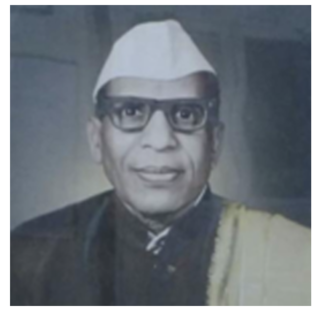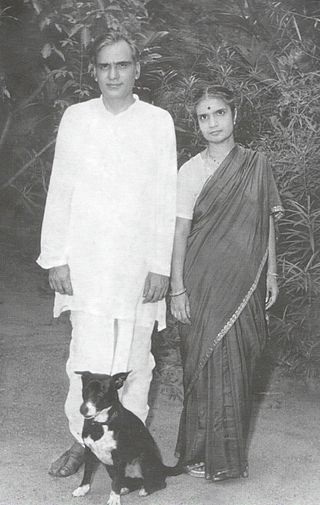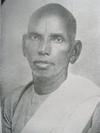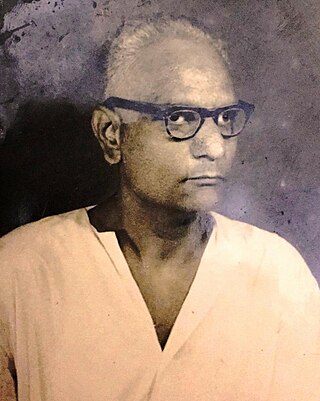
Akkineni Nageswara Rao, widely known as ANR, was an Indian actor and film producer, known for his work majorly in Telugu cinema. He starred in many landmark films in his seventy five-year career, and became one of the most prominent figures of Telugu cinema. Akkineni received seven state Nandi Awards, five Filmfare Awards South and a Tamil Nadu State Film Award. The highest honour in Indian cinema, Dada Saheb Phalke Award, was given to him at the 38th National Film Awards (1990). He was Honoured with Padma Vibhushan (2011), Padma Bhushan (1988) and Padma Shri (1968), India's second, third and fourth highest civilian awards, for his contributions to the fields of art and cinema.

Eenadu is the largest circulated Telugu-language daily newspaper of India sold mostly in the states of Andhra Pradesh and Telangana.

Veturi Sundararama Murthy, known mononymously by his surname Veturi, was an Indian poet, lyricist and journalist who is popular for writing Telugu songs. His career in Telugu cinema spanned more than four decades.

Nellore is a city located on the banks of Penna River, in Nellore district of the Indian state of Andhra Pradesh. It serves as the headquarters of the district, as well as Nellore mandal and Nellore revenue division. It is the fourth most populous city in the state. It is at a distance of 279 kilometres (173 mi) from Vijayawada and about 170 km (110 mi) north of Chennai, Tamil Nadu and also about 380 km (240 mi) east-northeast of Bangalore, Karnataka.

Telugu cinema, also known as Tollywood, is the segment of Indian cinema dedicated to the production of motion pictures in the Telugu language, widely spoken in the states of Andhra Pradesh and Telangana. Based in Film Nagar, Hyderabad, Telugu cinema has become the largest film industry in India by box-office revenue as of 2021. Telugu films sold 23.3 crore tickets in 2022, the highest among all Indian film industries. Andhra Pradesh is also the state with the highest number of movie screens in India.

Andhra Jyothi is the third largest circulated Telugu language daily newspaper of India sold mostly in the states of Andhra Pradesh and Telangana. It was founded by K. L. N. Prasad, an Industrialist on 1 July 1960. It is also one of the oldest running Telugu language daily newspapers. It was taken over by Vemuri Radha Krishna, also known as R. K. in 2002 who also works as the Managing Director.
Andhra Prabha - Journalism first is a Telugu language daily newspaper of India sold mostly in the states of Andhra Pradesh and Telangana. The newspaper is one of the oldest running Telugu-language daily newspapers of India. The newspaper and website (www.prabhanews.com) were owned by the New Indian Express Group of Companies but the newspaper was sold to entrepreneurs from Kakinada, Andhra Pradesh. The newspaper is owned by Mootha Gopalakrishna, former M.L.A of Kakinada city. The newspaper publishes neutral news not in support of any political organisation and is one of the most balanced and close-to-reality Telugu language daily newspapers.

Gadde Rajendra Prasad is an Indian actor who predominantly works in Telugu films. He is a recipient of four Andhra Pradesh state Nandi Awards, three SIIMA Awards, and three Santosham Film Awards.

Kasinadhuni Nageswararao, better known as Nageswara Rao Pantulu, was an Indian journalist, nationalist, politician, businessman, and a staunch supporter of Khaddar movement. He participated in the Indian independence movement and in the Indian National Congress party, including Mahatma Gandhi’s civil disobedience movement through salt satyagraha. He was conferred with the title Desabandhu by the people of Andhra Pradesh. He was a major financier of Congress activities in Andhra and Chennai and is also known for patenting Amrutanjan. He was conferred with the title Desoddhaaraka by the Andhra Mahasabha. In 1935, the Andhra University honoured him with Kalaprapoorna, an honorary doctorate of Literature.

Khandavalli Lakshmi Ranjanam M.A. is doyen of Telugu literature and research from Andhra Pradesh, India.

Sivalenka Sambhu Prasad was a journalist and Indian National Congress politician, who took over the Daily News Paper Andhra Patrika, Andhra Sachitra Vara Patrika and Bharathi which were published from Chennai City which was the capital of Composite State of Madras from his father-in-law Kasinadhuni Nageswara Rao, the founder of Andhra Patrika group of publications in 1903, inventor of "Amrutanjan", a pain balm with natural ingredients, in 1893 and a freedom-fighter. After taking over he led the group of publications from 1938 to 1972. Rao also bequeathed all properties and Amrutanjan business to Sambhu Prasad, which he ran along with publications. During Sambhu Prasad's lifetime there were many important events in India, including the Second World War, the Independence of India, and much of the life, and the death, of Mahatma Gandhi. He was called "Ayyavaru" by his employees. The centenary of his birth was celebrated in 2011 by a function was attended by dignitaries and journalists, including Chief Minister of Andhra Pradesh Konijeti Rosaiah.

Kalyanam Raghuramaiah (1901–1975), popularly known as Eelapata Raghuramaiah, was an Indian actor, and thespian known for his works in Telugu cinema, and Telugu theatre. A recipient of the Sangeet Natak Akademi Award, and the Padmashri, He was known for the roles of Krishna or Dushyantha, Bhavanisankar, Narada etc. He performed those roles for about 60 years. He indulged in elaborate raga alapana, based on different ragas while rendering padyams.

Konda Venkatappayya or Konda Venkatappaiah B.L. (1866–1948) was a noted Indian lawyer, freedom fighter, and politician from what is now Andhra Pradesh. He was one of the founders and the first editor of Krishna Patrika, a leading weekly Telugu magazine during the early 20th century.

Sakshi is an Indian Telugu language daily newspaper sold mostly in the states of Andhra Pradesh and Telangana. It was launched on 23 March 2008 by Jagati Publications Ltd. owned by Y. S. Jagan Mohan Reddy.
Nageswara Rao Panditharadhyula was a Telugu-language Indian journalist.
Duggirala Gopalakrishnayya, was an Indian freedom fighter and member of the Indian National Congress from the southern Indian state of Andhra Pradesh. Known by his title of Andhra Ratna (Telugu: ఆంధ్ర రత్న, translates to "Jewel of Andhra" or "Gem of Andhra." Sri Duggirala Gopalakrishnayya, Gopalakrishnayya was the first Andhra leader to become secretary of the All India Congress Committee. Sri Duggirala Gopalakrishnayya, was a very captivating poet, speaker, songwriter, philosopher, singer and an extraordinary revolutionary with a philosophy of non-violence. Sri Nadimpalli Venkata Lakshmi Narasimha Rao worked in tandem with Sri Duggirala Gopalakrishnayya. For his exemplary work and sacrifices for freedom movement in Andhra, he was fondly conferred the name 'Andhra Ratna'

Upādhyāyula Sūryanārāyaṇa Rāo (1923–1971) was a Telugu playwright and journalist who lived and worked in Vizianagaram, Andhra Pradesh. He was the grandson of the pandit Ajjada Adibhatla Narayana Dasu. A school drop-out, he educated himself in literature, history and philosophy. He was actively associated with the Telugu stage and was one of the founding members of the Sri Vijayarama Nataka Kala Parishat, which regularly conducted drama competitions. He was often invited by other organisers as a judge for drama competitions. He was associated with the Praja Socialist Party in its early years.

Digavalli Venkata Siva Rao, or Digavalli Śivarāvu, was a lawyer, historian and Telugu writer from Vijayawada, Andhra Pradesh. He is the author of forty-two books and some 300 articles written between 1924 and 1987. Some of his works are available in the Indian Digital Library.

Bapatla district is a district in coastal Andhra in the Indian state of Andhra Pradesh (AP) established on 4 April 2022. The administrative headquarters are in Bapatla. The district is formed from parts of the erstwhile Prakasam district and Guntur districts.
Mallikarjuna Panditaradhyudu was an Indian philosopher of Veerasaiva school and a Telugu poet from Andhra region. He was a poet in the court of Velanati Choda king Rajendra Choda II. His Śivatatvasāramu was the first independent Telugu work. Being a unique person of his era he contributed in spreading Saivism throughout Andhra region. He was credited with ending the remnants of Buddhism in Andhra land through his intellect and influence. For his prowess in Telugu language, he was generally referred to as Telugu: కవిమల్లు, romanized: Kavimallu, lit. 'Wrestler among poets'.
















